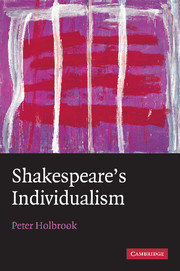Book contents
- Frontmatter
- Contents
- Acknowledgements
- Introduction
- PART I SHAKESPEARE, HAMLET, SELFHOOD
- PART II SHAKESPEARE AND EVIL
- 9 ‘Old lad, I am thine own’: authenticity and Titus Andronicus
- 10 Evil and self-creation
- 11 Libertarian Shakespeare: Mill, Bradley
- 12 Shakespearean immoral individualism: Gide
- 13 Strange Shakespeare: Symons and others
- 14 Eliot's rejection of Shakespeare
- 15 Shakespearean immoralism: Antony and Cleopatra
- 16 Making oneself known: Montaigne and the Sonnets
- PART III SHAKESPEARE AND SELF-GOVERNMENT
- Conclusion: Shakespeare's ‘beauteous freedom’
- Index
- References
13 - Strange Shakespeare: Symons and others
Published online by Cambridge University Press: 06 July 2010
- Frontmatter
- Contents
- Acknowledgements
- Introduction
- PART I SHAKESPEARE, HAMLET, SELFHOOD
- PART II SHAKESPEARE AND EVIL
- 9 ‘Old lad, I am thine own’: authenticity and Titus Andronicus
- 10 Evil and self-creation
- 11 Libertarian Shakespeare: Mill, Bradley
- 12 Shakespearean immoral individualism: Gide
- 13 Strange Shakespeare: Symons and others
- 14 Eliot's rejection of Shakespeare
- 15 Shakespearean immoralism: Antony and Cleopatra
- 16 Making oneself known: Montaigne and the Sonnets
- PART III SHAKESPEARE AND SELF-GOVERNMENT
- Conclusion: Shakespeare's ‘beauteous freedom’
- Index
- References
Summary
My aesthetic instincts became perverted. I relished nothing that was not vicious, morbid, fantastic, abnormal. When I was in the company of men and women, of thieves and of prostitutes, I made no excuses – no excuses were ever needed.
–The Memoirs of Arthur Symons: Life and Art in the 1890s, ed. K. Beckson (University Park, 1977), 72.In Sex, Literature, and Censorship, Jonathan Dollimore cites an article from 1908 proclaiming the ‘sanity of [Shakespeare's] genius’. Dollimore thinks this judgement wrong. Instead, he argues, Shakespeare expresses – under cover of conventional plots, speeches and so on – highly unconventional perspectives on basic moral, social and other questions: he is a purveyor of ‘dangerous knowledge’ (xii) – a reality that both ‘traditional’ and committed, or politically radical, criticism prefers not to notice. Dollimore rather valiantly assails enlightened critics – those in the habit of dismissing works of art as ‘sexist’, ‘racist’, ‘homophobic’, etc. – as all too often ‘defended against’ the challenges to progressive values such works might present (125). (For instance, a work of art might show that cruelty isn't invariably a product of bad social conditions.) Dollimore sees Shakespeare's sexual imagination as difficult in this way – as anti-social, even sick. Shakespeare is like Iago, a ‘malconent … complicit with what he condemns’.
- Type
- Chapter
- Information
- Shakespeare's Individualism , pp. 147 - 153Publisher: Cambridge University PressPrint publication year: 2010



